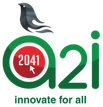Disability Innovation Lab
Supporting ideation, development, enhancement and commercialization of agriculture-focused innovations while protecting the intellectual property rights of the innovators.
E-specialized services for people with disabilities
Rahim, a 14-year-old blooming child suffered from a fatal accident at an earlier age. His left side of the body has been paralyzed. “When I woke up, everything was the same except my body.” Rahim broke into tears. “I lost control over my body and all my dreams were shattered within moments” he added. Rahim belongs to a middle-class family who lives in a remote area of Mymensing. Both of my parents work at the primary school and it is very difficult for them to take care of Rahim physically and financially. “It is very difficult to carry me to the CRP center twice a month. I seem to trouble my parents a lot but they never express.” A digital patient follow-up system will make it easier for people like Rahim to seek quality services complying with core values of equality, justice and cost-efficiency. A2I initiative of the Service Innovation Fund (SIF) has made it possible for an automated patient follow-up system to be launched, named “Community Digital Information and Service Booth” under Upazilla Disabled People Development Council (UDPDC). This initiative is capable of providing upgraded healthcare support for physically challenged people in remote and out-of-reach places through neat integration of easily available technology (telemedicine, video conferencing, regular follow-up through mobile, etc).

“This is a helpful initiative. I believe my parents would take a breath of relief. Now service is coming to me.” Rahim responded thankfully.
Living in a competitive world is getting more and more difficult with time. If things aren’t easy for healthy beings then it is beyond imagination how unfavorable the fast pacing world must be for people with disabilities. Every task is challenging for them. They need as much user-friendly support systems as possible. Centre for the Rehabilitation of the Paralyzed (CRP) has been persistently trying to provide the patients with more accessible advanced facilities but the patient follow-up procedures applicable to individuals with disabilities have been very slow and expensive till now. The project “E-specialized services for people with disabilities” has been initiated to provide an advanced digital patient follow-up system for those underprivileged people.
Within 6 months of operation, the project developed 08 Upazila level CDISB under Upazilla Disabled People Development Councils (UDPDC) with advanced specialized services. This project has been developed for the purpose of social and economic of disable people in the rural areas of Bangladesh, as well as access to information with Community Digital Information and Service Booth (CDISB). All the beneficiaries of the project are physically impaired and socially discriminated. This project will be helpful to ensure access to information from various services providing organization, employment and income generation, training, capacity & skill development for the people with disabilities and it will ensure their development in a sustainable manner.
Story of a disability-centered innovation and its innovator
Vaskar Bhattacharjee, a visually impaired Bangladeshi working at a local NGO, had a difficult time at school trying to study with outdated braille books and scarcity of teachers who knew the techniques of teaching using braille books. His mother could not always manage time to read out texts from the regular curriculum books. Through his work with the NGO called YPSA, Vaskar got the idea of converting the regular curriculum textbooks into DAISY standard braille books and audiobooks which the visually impaired could not only touch, but also listen to. But, the NGO itself could not have managed the necessary finance for project implementation and approval from the policymakers. Here came into effect a2i’s Service Innovation Fund which provided the startup fund required to do the piloting of the idea. The books were checked for quality conformance by the relevant government agencies and, on the book distribution day at the beginning of the calendar year, the Honorable Prime Minister to the Government of the People’s Republic of Bangladesh officially launched the books.
A holistic approach is necessary for successful disability-centered innovation
This story reflects how a2i has successfully used a holistic approach to:
But, this was a one-off example of innovation and a2i has already funded multiple initiatives addressing almost all types of disability. In the meanwhile, a2i realized that institutionalizing its support to the PWDs can create the necessary sectoral level impact for the benefit of the majority of the PWDs in Bangladesh. So, a2i conceived of designing and developing a “Disability Innovation Lab” also known as DLab.
Disability Innovation Lab: Nurturing solutions for the PWDs
DLab is a platform where all stakeholders, working directly and indirectly to secure the rights of PWDs, can come together and work to achieve the common goal of ‘ensuring accessibility for the persons with disabilities so that the PWDs can live an independent life using their fullest potential.’ The DLab supports ideation, development, enhancement and commercialization of disability-centric products and services while protecting the intellectual property rights of the innovator. It not only provides the opportunity to ‘test’ the prototypes at a local level to incorporate ‘PWD’s demand’ using participatory approaches but also encourages the PWDs to solve their own problems and get involved from ‘idea generation’ to ‘upscaling’. Again, the DLab provides financial, policy/regulatory and business support to scale up successful innovative solutions. Going forward, the lab will share the best practices, exchange ideas and develop similar networks to other resource-poor countries as part of South-South and Global Cooperation. The D-Lab has already made some important partnerships, like that with the University of Chittagong for developing an inclusive university and a disability research lab for identifying problems of students with disabilities and developing low-cost, available and accessible assistive devices.


